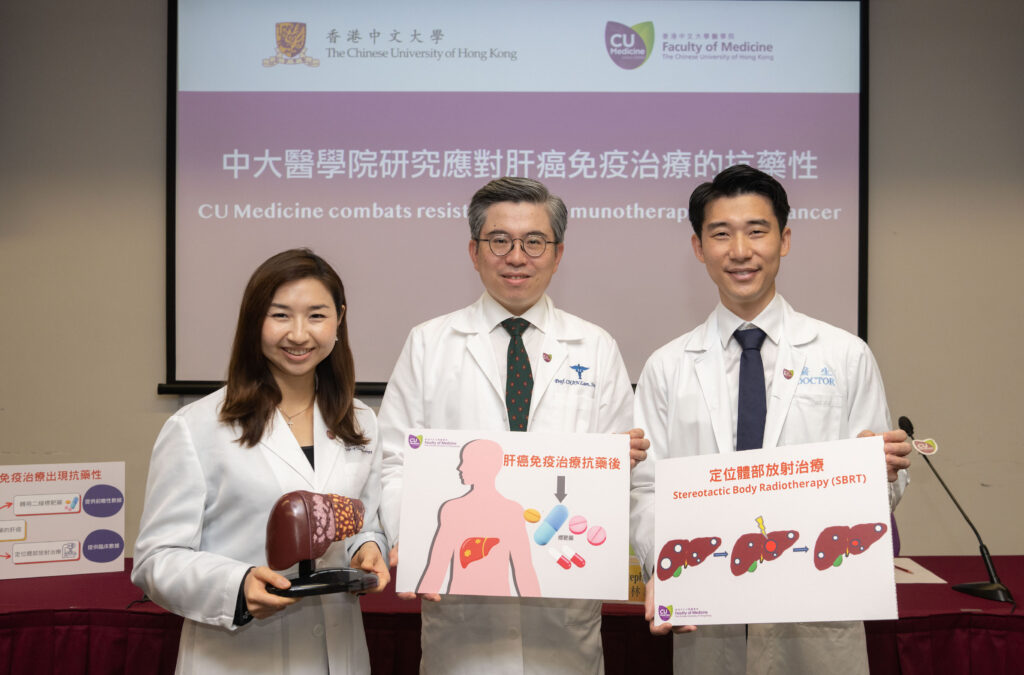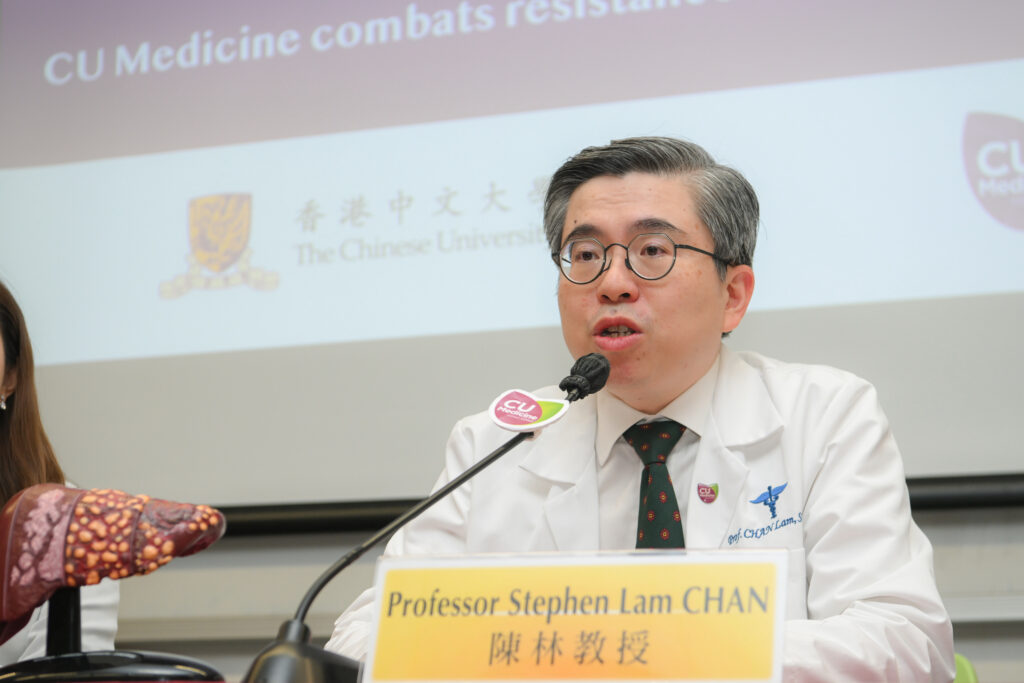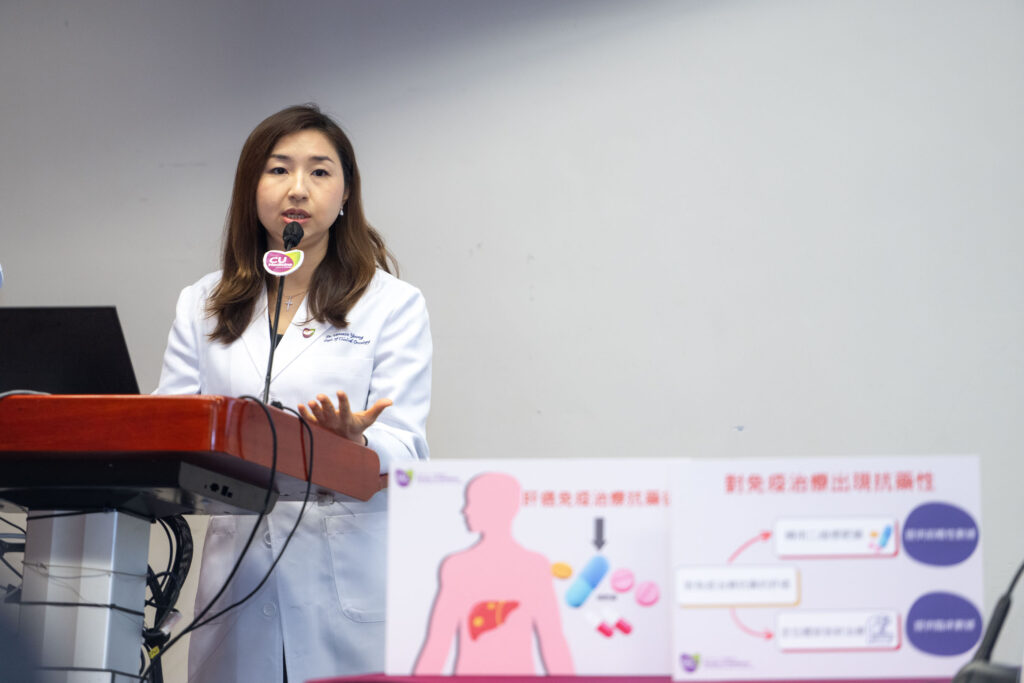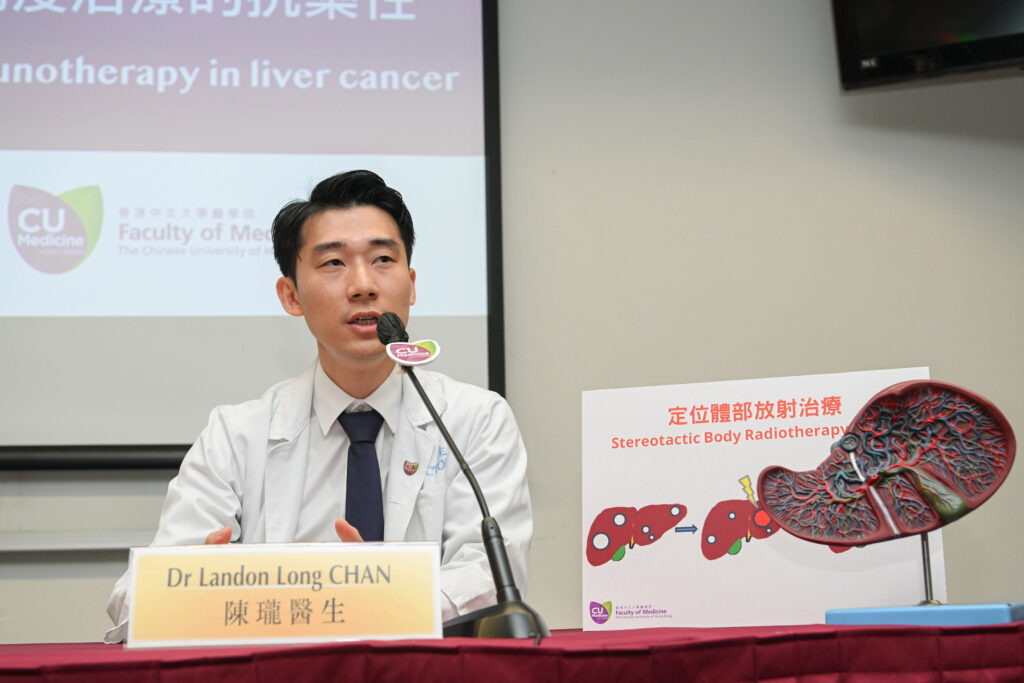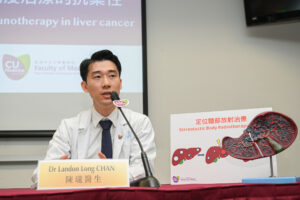CUHK
News Centre
CU Medicine combats resistance to immunotherapy in liver cancer
Primary liver cancer is the fourth leading cause of death from cancer worldwide and third in Hong Kong. Over 1,400 people died of the cancer locally in 2021. Doctors frequently use immunotherapy to combat liver cancer that is at an advanced stage that cannot be removed by surgery. However, even with a good initial response, over 80% of patients will subsequently develop resistance to immunotherapy after about seven months of treatment. Finding treatment alternatives for people who are resistant to immunotherapy for liver cancer has been a hot topic of research globally. The Chinese University of Hong Kong (CUHK)’s Faculty of Medicine (CU Medicine) has initiated a series of research projects to tackle the problem, recently identifying potential in an oral targeted agent and radiotherapy after patients fail to respond to immunotherapy.
A multi-centre clinical trial of targeted treatment
CU Medicine led a multi-centre clinical trial between October 2020 and May 2022 alongside another two research sites in South Korea, studying the use of an oral targeted agent in advanced liver cancer patients who develop resistance to immunotherapy.
Results showed that patients survived for a median of 14.3 months after targeted treatment, if they had only received one line of immunotherapy before. The disease at least partly stabilised in over 80% of patients after they started treatment with the targeted agent, with a partial response[1] in 6.4% and a stable disease[2] in 76.6%. Most of the patients tolerated the medication well, with only 6.4% of them suffering from moderate to severe side effects. The study has been presented at multiple international meetings and recently published in the Journal of Hepatology.
Professor Stephen Chan, Ip’s Family Trust Professor of Clinical Oncology of the Department of Clinical Oncology at CU Medicine, stated, “This is the first clinical trial in the world to report the use of drug t in the treatment of immunotherapy-resistant liver cancer. The study provides invaluable data for reference by clinicians and guidelines on liver cancer treatment.
“I am also grateful to the participating patients, their families and, commercial and my academic collaborators in South Korea for working together during the COVID pandemic. The reviewers of the paper were very impressed by the speed and efficiency of our group.”
Use of radiotherapy in selected conditions
Apart from drug treatment, the CU Medicine researchers also investigated the use of radiotherapy on liver cancer patients who had developed resistance to immunotherapy. Though radiotherapy has been used by doctors in the treatment of liver cancer for over 10 years, its role in immunotherapy-resistant liver cancer is less clear. CU Medicine researchers reviewed the clinical outcomes of 105 liver cancer patients who had received radiotherapy between 2016 and 2022. Of the 5 patients who have developed resistance to immunotherapy, they found that the addition of radiotherapy to patients with limited cancer volume in the liver could survive for a median period of 24.5 months without any significant side effects. They also observed that some patients with main portal vein thrombosis responded to radiotherapy.
Dr Vanessa Yeung, Associate Consultant in the Department of Clinical Oncology at the Prince of Wales Hospital and Clinical Assistant Professor (honorary) in the Department of Clinical Oncology at CU Medicine, stated. “This is the first case series of patients on whom radiotherapy has been used in the treatment of liver cancer, after immunotherapy had failed. Despite the small scale of the study, the results showed that radiotherapy is effective in some patients.”
Dr Landon Chan, Assistant Professor in the Department of Clinical Oncology at CU Medicine, expected more roles for radiotherapy in the future. He said, “More animal and human studies indicate a synergy between radiotherapy and immunotherapy. We are currently planning a number of clinical trials to expand the role of radiotherapy in the treatment of liver cancer.” The study has also been recently published in the Journal of Hepatology.
[1] Partial response is defined as a decrease in the size of a tumour, or in the extent of cancer in the body, in response to treatment.
[2] Stable disease is defined as a condition in which tumours stay about the same size and no new tumours appear.
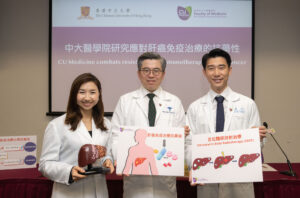
CU Medicine led a multi-centre prospective clinical trial with two research sites in South Korea, proving that the use of an oral targeted agent in advanced liver cancer patients who developed resistance to immunotherapy could prolong survival to a median of 14.3 months.
(From left) Dr Vanessa Yeung, Associate Consultant in the Department of Clinical Oncology at the Prince of Wales Hospital and Clinical Assistant Professor (honorary) in the Department of Clinical Oncology at CU Medicine; Professor Stephen Chan, Ip’s Family Trust Professor of Clinical Oncology and Dr Landon Chan, Assistant Professor in the Department of Clinical Oncology at CU Medicine.
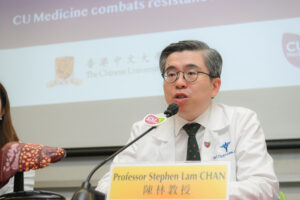
Professor Chan says every doctor does his or her own way to treat liver cancer patients who have developed resistance to immunotherapy nowadays. The prospective targeted agent study provides invaluable data for reference by clinicians and guidelines on liver cancer treatment.
CU Medicine combats resistance to immunotherapy in liver cancer
Primary liver cancer is the fourth leading cause of death from cancer worldwide and third in Hong Kong. Over 1,400 people died of the cancer locally in 2021. Doctors frequently use immunotherapy to combat liver cancer that is at an advanced stage that cannot be removed by surgery. However, even with a good initial response, over 80% of patients will subsequently develop resistance to immunotherapy after about seven months of treatment. Finding treatment alternatives for people who are resistant to immunotherapy for liver cancer has been a hot topic of research globally. The Chinese University of Hong Kong (CUHK)’s Faculty of Medicine (CU Medicine) has initiated a series of research projects to tackle the problem, recently identifying potential in an oral targeted agent and radiotherapy after patients fail to respond to immunotherapy.
A multi-centre clinical trial of targeted treatment
CU Medicine led a multi-centre clinical trial between October 2020 and May 2022 alongside another two research sites in South Korea, studying the use of an oral targeted agent in advanced liver cancer patients who develop resistance to immunotherapy.
Results showed that patients survived for a median of 14.3 months after targeted treatment, if they had only received one line of immunotherapy before. The disease at least partly stabilised in over 80% of patients after they started treatment with the targeted agent, with a partial response[1] in 6.4% and a stable disease[2] in 76.6%. Most of the patients tolerated the medication well, with only 6.4% of them suffering from moderate to severe side effects. The study has been presented at multiple international meetings and recently published in the Journal of Hepatology.
Professor Stephen Chan, Ip’s Family Trust Professor of Clinical Oncology of the Department of Clinical Oncology at CU Medicine, stated, “This is the first clinical trial in the world to report the use of drug t in the treatment of immunotherapy-resistant liver cancer. The study provides invaluable data for reference by clinicians and guidelines on liver cancer treatment.
“I am also grateful to the participating patients, their families and, commercial and my academic collaborators in South Korea for working together during the COVID pandemic. The reviewers of the paper were very impressed by the speed and efficiency of our group.”
Use of radiotherapy in selected conditions
Apart from drug treatment, the CU Medicine researchers also investigated the use of radiotherapy on liver cancer patients who had developed resistance to immunotherapy. Though radiotherapy has been used by doctors in the treatment of liver cancer for over 10 years, its role in immunotherapy-resistant liver cancer is less clear. CU Medicine researchers reviewed the clinical outcomes of 105 liver cancer patients who had received radiotherapy between 2016 and 2022. Of the 5 patients who have developed resistance to immunotherapy, they found that the addition of radiotherapy to patients with limited cancer volume in the liver could survive for a median period of 24.5 months without any significant side effects. They also observed that some patients with main portal vein thrombosis responded to radiotherapy.
Dr Vanessa Yeung, Associate Consultant in the Department of Clinical Oncology at the Prince of Wales Hospital and Clinical Assistant Professor (honorary) in the Department of Clinical Oncology at CU Medicine, stated. “This is the first case series of patients on whom radiotherapy has been used in the treatment of liver cancer, after immunotherapy had failed. Despite the small scale of the study, the results showed that radiotherapy is effective in some patients.”
Dr Landon Chan, Assistant Professor in the Department of Clinical Oncology at CU Medicine, expected more roles for radiotherapy in the future. He said, “More animal and human studies indicate a synergy between radiotherapy and immunotherapy. We are currently planning a number of clinical trials to expand the role of radiotherapy in the treatment of liver cancer.” The study has also been recently published in the Journal of Hepatology.
[1] Partial response is defined as a decrease in the size of a tumour, or in the extent of cancer in the body, in response to treatment.
[2] Stable disease is defined as a condition in which tumours stay about the same size and no new tumours appear.


